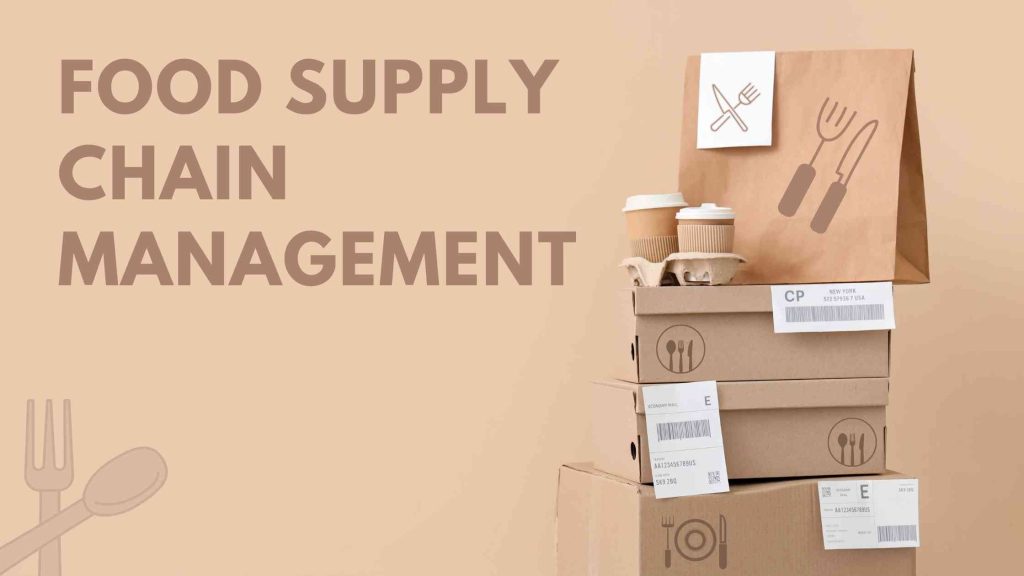Efficient and effective supply chain management is crucial for success in the food industry. With complex processes, stringent regulations, and ever-changing consumer demands, food manufacturers and distributors need specialized solutions to navigate the challenges and seize opportunities.
We explore how customized food supply chain management solutions empower businesses to streamline operations, ensure product quality and safety, optimize logistics, and achieve overall success.
End-to-End Visibility and Traceability:
Specialized solutions offer end-to-end visibility and traceability across the food supply chain, from sourcing raw materials to delivering finished products to customers. Through real-time monitoring and data capture, these solutions enable manufacturers and distributors to track and trace products at every stage, ensuring compliance with food safety standards, identifying potential issues or bottlenecks, and facilitating swift recall management, if necessary. Complete visibility and traceability enhance transparency, build consumer trust, and mitigate product quality and safety risks.
Demand Planning and Forecasting:
Accurate demand planning and forecasting are critical to optimize inventory levels, minimize waste, and meet customer expectations. Specialized solutions utilize advanced analytics, historical data, and market trends to generate accurate demand forecasts. By leveraging these insights, manufacturers, and distributors can optimize production and procurement schedules, reduce inventory holding costs, minimize stockouts, and improve customer satisfaction. Demand planning and forecasting enable businesses to align their operations with market demand and respond proactively to changing consumer preferences.
Inventory and Warehouse Management:
Efficient inventory and warehouse management are vital for maintaining product freshness, minimizing product loss, and ensuring timely order fulfillment. Specialized solutions provide robust inventory management functionalities, including real-time tracking, lot management, shelf-life monitoring, and rotation management. Integrated warehouse management systems optimize storage space utilization, enable efficient picking and packing processes, and facilitate accurate inventory reconciliation. By streamlining these operations, businesses can reduce costs, improve order accuracy, and deliver products more efficiently.
Supplier and Vendor Collaboration:
Collaboration with suppliers and vendors is crucial to food supply chain management. Specialized solutions enable seamless communication and collaboration, facilitating information sharing, order processing, and inventory visibility across the supply chain network. By integrating suppliers and vendors into the system, businesses can enhance supplier performance, improve procurement processes, negotiate better pricing terms, and ensure timely delivery of raw materials. Effective collaboration strengthens partnerships, reduces lead times, and enhances supply chain efficiency.
Compliance with Regulatory Standards:
The food industry is subject to numerous regulations and standards to ensure food safety, labeling accuracy, and traceability. Specialized solutions help businesses maintain compliance by providing tools to manage regulatory documentation, monitor compliance requirements, and generate accurate reports. These solutions automate compliance processes, reducing the risk of errors and penalties. By streamlining compliance activities, businesses can focus on core operations, maintain brand reputation, and build trust among consumers and regulatory bodies.
Performance Monitoring and Continuous Improvement:
Specialized solutions offer performance monitoring capabilities, enabling businesses to track KPIs and estimate supply chain performance. These solutions provide real-time dashboards, analytics, and reporting tools to identify areas of improvement, monitor supplier performance, optimize logistics operations, and enhance overall supply chain efficiency. By leveraging data-driven insights, businesses can make informed decisions, drive continuous improvement initiatives, and achieve operational excellence.
Conclusion:
In complex and competitive food supply chain management, specialized solutions empower businesses to succeed by streamlining operations, ensuring product quality and safety, optimizing logistics, and maintaining compliance with regulatory standards. By embracing these solutions, food manufacturers and distributors can gain end-to-end visibility, enhance traceability, improve demand planning, streamline inventory and warehouse management, strengthen supplier collaboration, and drive continuous improvement. With specialized solutions, businesses
How Acumatica ERP can enhance Food Supply Chain Management
In conclusion, Acumatica ERP offers a comprehensive solution that significantly enhances Food Supply Chain Management. Its robust features and functionalities, Acumatica enables streamlined processes, improved visibility, and efficient collaboration across the entire supply chain. Acumatica optimizes the flow of goods, minimizes wastage, and ensures timely delivery of fresh and safe food products by integrating and automating critical operations such as inventory management, demand forecasting, production planning, and logistics coordination.
Real-time analytics and reporting capabilities empower stakeholders with actionable insights to make informed decisions, mitigate risks, and drive continuous improvement. Acumatica ERP is a game-changer for the food industry, facilitating greater efficiency, traceability, and customer satisfaction, while ultimately contributing to the overall sustainability and success of food supply chain management.

Vijay comes with a vast experience in ERP and enterprise solutions space with about 20 years of experience in various packaged application like Acumatica, SAP, Orion, Salesforce.com, SugarCRM and, SalesLogix.

